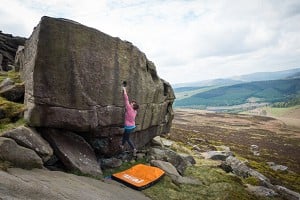
Michaela Tracy has been climbing for 15 of her 24 years. It's clear that climbing has played a major role in her life, and having known Michaela for the majority of this time, I've seen her go down various routes and to different places, but most importantly - she has always made her mark on whatever she chooses to do. Michaela's individuality is a quality that really defines her, but it's her quirky character and passionate determination to achieve her goals that truly make her stand out from a crowd.
Not one to jump on the bandwagon of self-promotion, social-media and overt sponsorship, you may not have heard too much about her understated achievements. Despite her relatively low profile, Michaela is one of the UK's top multi-discipline climbers - with redpoints up to 8b, boulder problems up to 8A, podiums in national lead competitions, a win in the British Bouldering Championships and most recently - a 6th place in the Bouldering World Championships last year. Originally from London, Michaela moved to Sheffield four years ago to study and make the most of the Sheffield climbing scene.
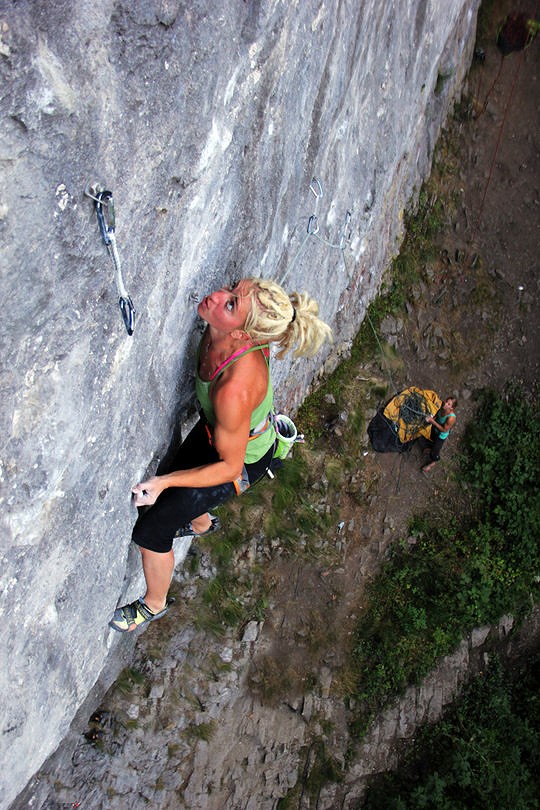
Having sustained a shoulder injury shortly after her World Championship success last year, I heard that Michaela had turned her attention towards trad climbing in the meantime, with onsights up to E5 - a fine example of her ability to adapt to a challenging situation and turn it into an opportunity. Michaela is very much at a turning point in her career, as she begins a PhD in Sheffield and looks to her future.
Gutsy, determined and eccentric in the nicest possible way, I thought she could make for a fascinating interview subject...
"My relationship with climbing seems to change all the time. At the moment we’re going through a good patch. Times like these are amazing because climbing becomes this thing that lifts my life out of the everyday; going to outrageous places and having adventures, being able to exist only in the current moment."
Tell us about your background and early climbing career - what got you into it?
I started climbing when I was nine. My dad had climbed a bit in America and had decided to get back into it, so he took me and my sisters to the nearest wall in London which consisted of a traverse wall above a basketball court and one grotty bouldering room. I actually still have snapshot memories of that day; of being on this wall and how it felt, I was pretty terrified but I also immediately loved it. After that I started climbing with my dad more often, eventually moving to better walls and even making some ventures outside - including one particularly scarring early experience at southern sandstone.
What was it about climbing that kept you at it?
As I got older I started going to the wall more and more; every weekend, during the week, eventually just by myself. Over time it became such an integral part of my life. When I finished school every day all I wanted to do was go climbing. I don’t know exactly what it was about it, I just couldn’t imagine wanting to do anything else.
Who inspires you in life/climbing?
I’ve never really understood the concept of being inspired by people. I suppose I am inspired by places and certain routes, not people - although Beat Kammerlander is pretty cool.
"I’d been on a few climbing trips when I lived in London, but I never really got it. Especially climbing in the Peak District. I’d suffer through yet another weekend; cold, wet, frustrated, with no skin left on my fingertips, thinking: this is supposed to be fun?"
You were successful on the youth scene in making podium finishes at national level and making international lead finals. What do you remember most about these years and what have you taken from these experiences?
I know that a lot of people have really good experiences with youth competitions, and I’m grateful in a way because I don’t think I’d be living where I am today, doing the kind of things that I’m doing, if I’d never done them, but my experiences of youth competitions were overwhelmingly negative. The approach was very goal oriented, there was a lot of focus on performance; and it turned climbing, which is essentially just a game into something serious, which was quite harmful. After my last year in juniors I basically quit climbing for a while because I’d completely lost touch with why I was doing it at all. All the enjoyment had been taken away.
When did you first turn your attention to the rock? How did growing up in London affect your opportunity to get outside?
I’d been on a few climbing trips when I lived in London, but I never really got it. Especially climbing in the Peak District. I’d suffer through yet another weekend; cold, wet, frustrated, with no skin left on my fingertips, thinking: this is supposed to be fun?
I guess the first time I really understood was probably four years ago, went I went on an extended trip to Europe. I was with my boyfriend at the time, and we’d kind of set out with no real plan; but we had this van, some money saved and a one-way ferry ticket to Bilbao. It was very nearly a disaster, but ended up being one of the best decisions I ever made. I’d recently taken up climbing again after stopping, I couldn’t remember why it was good though, it still felt like I was just going through the motions, but the trip reminded me - in a way it saved me.
How would you describe your relationship with climbing?
My relationship with climbing seems to change all the time. At the moment we’re going through a good patch. Times like these are amazing because climbing becomes this thing that lifts my life out of the everyday; going to outrageous places and having adventures, being able to exist only in the current moment. Sometimes it’s not as easy, but I hope it’s something I’ll have in some form for the rest of my life.
How has your approach to climbing changed in recent years (if at all?)
I think I’ve stopped taking it so seriously. I don’t mean it’s not as important to me, it’s maybe more important, but I don’t do it for serious reasons. I guess I realised that it doesn’t really matter.
How much of your climbing do you attribute to mental and physical aspects? - i.e. 50/50, 60/40 etc...
I think the mental and physical sides of climbing are hard to disentangle from one another, being strong physically helps you to be stronger mentally - and vice-versa. There is a distinct mental aspect to climbing, which is especially obvious in competitions in terms of being able to shut out everything around you and just try really, really hard - but it’s hard to put a value to how much that is worth. It depends, when you’re really at the edge of your physical limit, I guess it’s worth 100 percent because if your mind isn’t there there’s no way you’re getting to the top.
"Bouldering competitions are actually, in a way, fairly similar to trad climbing: you’re in a high stress situation, you need to work out the solution to a problem and execute it quickly - preferably without falling off."
Last year you had an astonishing run of form - winning the BBCs and finishing 6th in the World Championships in Munich (having qualified in 1st place for the finals!) What do you put this down to?
That was down to a number of things. Most importantly I think, I did a lot of training with Zippy, who I’ve known for a long time and really respect as a coach. Going back to the trying hard thing, he’d invented these horrible exercises where it was physically impossible to succeed. If you ever started getting close to success, they’d just get harder. I think that helped a lot because all you had to focus on was trying really hard; which at the base of it is what bouldering competitions are all about.
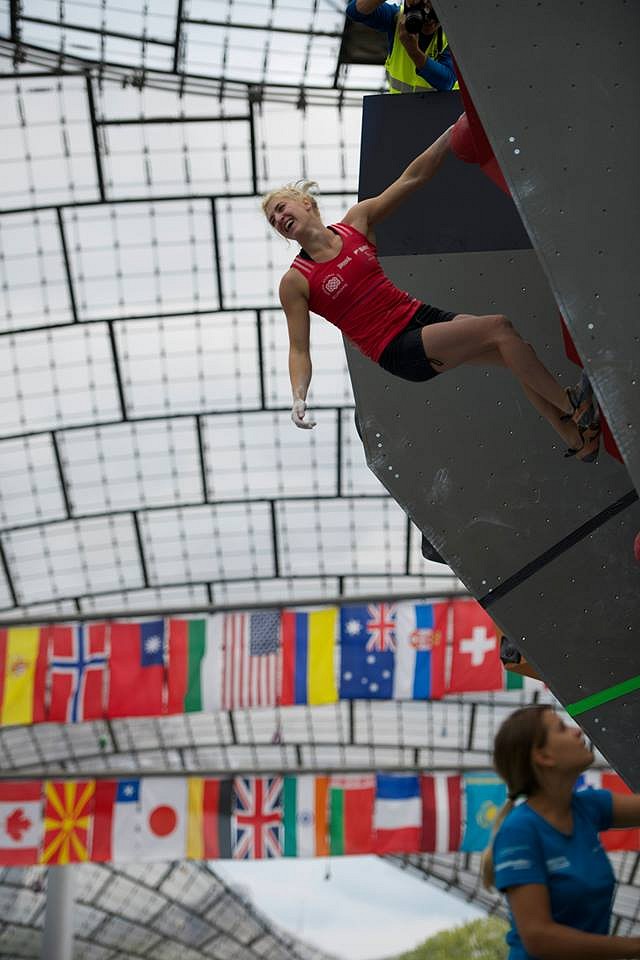
You were predominantly a lead climber on the competition circuit up until a few years ago - why did you switch to bouldering?
Bouldering competitions are a lot more complex. Lead climbing, you wait around all day just to spend a maximum of seven minutes on a route you’ve already seen the sequence for - there’s not really that much mental engagement; they’re all about executing.
In bouldering there are a lot more variables. You can have hours in isolation, completely shut off from the outside world, then there’s this manic forty-five minute period where you have five minutes to work out a climb and get to the top, then five minutes to put yourself together again and you’ve got to do that five times before you’re out the other side. And unlike in route competitions you can fall off, and you can fail, but it’s all about how you manage that; it’s a different mental game definitely, and for me a more interesting one.
You spoke out about the importance of the Women's Climbing Symposium last year, with an honest confession that you hadn't previously seen the benefit of or need for it. What made you change your mind?
I guess I was just walking around in a little bubble where I didn’t really pay attention to what was going on around me. I thought everyone thought the way I thought - and I don’t really care if the people I’m climbing with are women or men. I didn’t realise that people found the fact that climbing is, I suppose, still quite a largely male-dominated sport in any way difficult, or that it would hold them back at all, or that they would even think twice about it. Maybe I started talking to people more, and it made me realise that other people are coming from different places to me and might have different viewpoints.
What changes (if any) do you see in women's climbing in the UK. In what direction is it heading?
Um. Hard to answer. I don’t actually feel like women’s climbing in the UK has moved forwards over the last ten or so years as much as we might like, or might like to think. Yes, at the top end there have been some amazing achievements and there are starting to be a few more women getting on with harder stuff - but as a whole we’re still way behind, especially if you start looking at trad and winter climbing. I can’t say which way it’s going, because I can’t see into the future, but I would like to see it not be seen as an exception for women to be climbing as hard as men on any given day, at any given crag. You know, you still get that thing where people are really impressed because you did a climb that wasn’t actually that hard just because you’re a woman. That’s just ridiculous.
Do you plan to push your grade further on rock or are competitions a priority for now?
I wouldn’t say that competitions are a priority as such. Especially at the moment; I injured my shoulder before the start of the world cup season and had to spend a lot of time resting and rehabbing it, so I decided to take this year off from competitions.
I have a list of routes in my head which I want to climb, both immediately realisable and ones which will have to remain dreams for now. As I recently graduated and will be starting a PhD in September, I have a lot of time this summer to go climbing. I’m planning on getting out as much as possible and hopefully doing some of the routes on my list rather than just thinking about them!
How did you combine your studies with training? What advice would you give to a competition climber also wanting to pursue further education?
Not very well? I definitely had some times whilst I was at university where I felt like I was really struggling to juggle all the things I wanted to do with the time I had, and that I was bound to drop something sooner or later. I guess I learned as I went along. You have to make some decisions about what you want to do, and you have to make sacrifices - like turning down chances to go outside, or spend time with people, or go on holiday, to train at the wall instead. Which is ok if that’s what you want, but I’d recommend thinking pretty hard about it because what you get back might not be worth what you give up.
"I went trad climbing for the first time in March this year. Honestly I was always a bit dismissive of it until then, but that’s because I didn’t know what I was talking about. It’s pretty incredible, that there was this whole other side of climbing that existed for so long without me knowing about it."
Now you live in Sheffield, do you notice anything different about people's approach to training or climbing in general?
I think there’s definitely a difference in attitude generally to climbing in Sheffield. London’s nowhere near any rock so people climb for the majority indoors and then occasionally get away on the weekend or for trips. In Sheffield you can be climbing at a crag within half an hour, you can go out at night after work if you’ve got lanterns; and that’s important because you don’t just get the physical side of climbing - you also get the experience of being outside, maybe in a beautiful place, being somewhere quiet and away from everything and everyone. For me that’s a really big part of climbing.
Have you been lured into gritstone trad?
I went trad climbing for the first time in March this year. Honestly I was always a bit dismissive of it until then, but that’s because I didn’t know what I was talking about. It’s pretty incredible, that there was this whole other side of climbing that existed for so long without me knowing about it. I’ve not been on gritstone much, it’s a bit warm for that, but I’ve spent some time at places like Pembroke and Gogarth, and in Llanberis pass. Having done some now I can say that there is something pretty special about this style of climbing, perhaps the freedom, the undercurrent of fear, the amount of time you end up spending inside your own head. Anyway, it’s something I can see myself doing a lot more of.
What inspired you get into trad recently then?
One of the main reasons I went trad climbing for the first time was due to the fact that I’d hurt my shoulder earlier in the year which meant I had to take a lot of time off from climbing and training, and also meant I couldn’t do any of the world cups. I was going a bit crazy in Sheffield, and someone asked me if I wanted to go to Pembroke for the weekend - so of course I said yes, despite the fact that I’d never done any trad climbing before, and hadn’t even really wanted to. In short, that trip opened my eyes; it was one of the most intense climbing experiences I’d ever had, and when we finally got back to Sheffield I could barely sleep, all I wanted to do was get out and do it again. So I ended up badgering people most weekends to take me out climbing; to Pembroke, Gogarth, Llanberis Pass… Luckily I think the fact that I actually wanted to go TRAD climbing was a bit of a novelty, so normally they would.
"Sea-cliffs in particular are something I find really special. Sometimes I find myself in places thinking, “I shouldn’t be here; people shouldn’t be here!”"
If I had to say exactly what it was about trad climbing that drew me in so quickly and completely, I’d say it has something to do with the complexity of the problem. Rather than it just being a question of whether you can physically get up the route, you also have to remember which way the route goes, find the holds, find the gear and be able to place it without getting too pumped - and all this while keeping on top of yourself in a position of potential danger. You spend hours in this headspace where the only thing that exists is the route unfolding around you. And also of course there’s the fact that you can end up climbing in some amazingly beautiful and utterly outrageous positions. Sea-cliffs in particular are something I find really special. Sometimes I find myself in places thinking, “I shouldn’t be here; people shouldn’t be here!”
How does your background of comps, sport and bouldering help you (if it does) in your trad?
Bouldering competitions are actually, in a way, fairly similar to trad climbing: you’re in a high stress situation, you need to work out the solution to a problem and execute it quickly - preferably without falling off. While I was doing competitions I developed some tricks to help shut off conscious thought to a certain extent, so you can climb without your mind getting in the way. This has been really useful in trad climbing, because I found early on that if you don’t keep your mind in check you can end up in a real panic, which isn’t conducive to upwards movement. Of course there’s a slight difference in trad climbing in that the danger of falling can be real, I’m not sure that I’ve really worked out how to factor that in correctly yet…
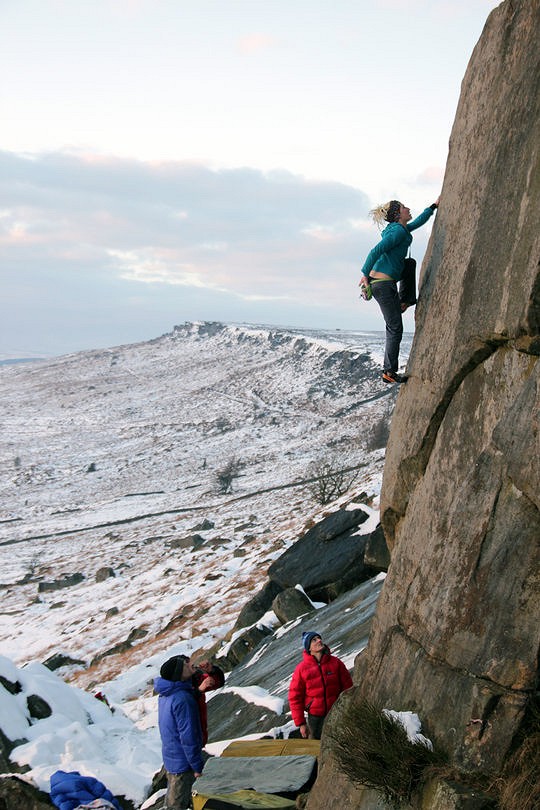
What are your ambitions in trad?
I had a go at Point Blank the first time I went to Pembroke after top-roping it a few times and ended up taking a monster fall off the last hard moves, so I’d like to go back and finish that obviously. There’s also a Dave Birkett route called Skye Wall I’d love to have a go at, because it just seems like an incredible undertaking. Beyond that there are a few routes I’d like to try onsight, like Right Wall, Lord of the Flies, Ghost Train and Skinhead Moonstomp. I’m also really interested in some of the George Smith roof routes at Gogarth, like The Ultraviolet Exterminator and Roof Rack - although those are more long term as I think I need to be a bit more generally competent first. One ultimate dream really is to do Prinzip Hoffnung, which is a Beat Kammerlander route. Actually I saw a video of him climbing the route once, which was one of the things which pushed me into trad climbing in the first place - I knew that if I didn't learn, there was no way I’d ever be able to climb this route!
What are your future plans and goals?
This summer I plan to spend most of my time in the uk, trad and sport climbing. Like I said, I’ve got a list of routes to do so I’m going to try to get started on that. I’d like to spend a lot more time at Gogarth in particular. After that I’ll be continuing my studies in Sheffield so I might get back into training for the world cups. I try not to plan too far ahead - I’ll see what happens!
Describe yourself in three words...
Rare to medium.
Michaela is sponsored by: Scarpa and Climbskin
- SKILLS: Top Tips for Learning to Sport Climb Outdoors 22 Apr
- INTERVIEW: Albert Ok - The Speed Climbing Coach with a Global Athlete Team 17 Apr
- SKILLS: Top 10 Tips for Making the Move from Indoor to Outdoor Bouldering 24 Jan
- ARTICLE: International Mountain Day 2023 - Mountains & Climate Science at COP28 11 Dec, 2023
- ARTICLE: Did Downclimbing Apes help Evolve our Ultra-Mobile Human Arms? 5 Dec, 2023
- ARTICLE: Dàna - Scotland's Wild Places: Scottish Climbing on the BBC 10 Nov, 2023
- INTERVIEW: Loki's Mischief: Leo Houlding on his Return to Mount Asgard 23 Oct, 2023
- INTERVIEW: BMC CEO Paul Davies on GB Climbing 24 Aug, 2023
- ARTICLE: Paris 2024 Olympic Games: Sport Climbing Qualification and Scoring Explainer 26 Jul, 2023
- INTERVIEW: Malcolm Bass on Life after Stroke 8 Jun, 2023



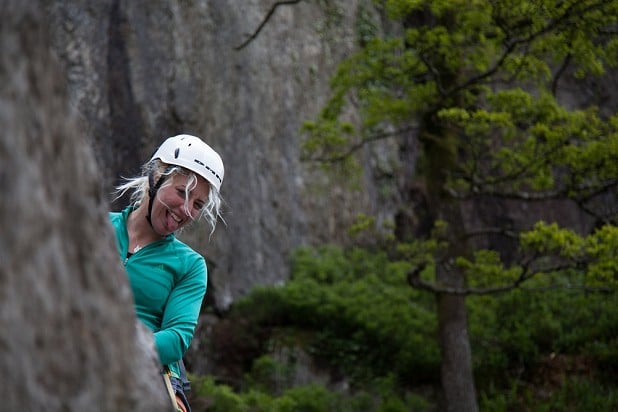
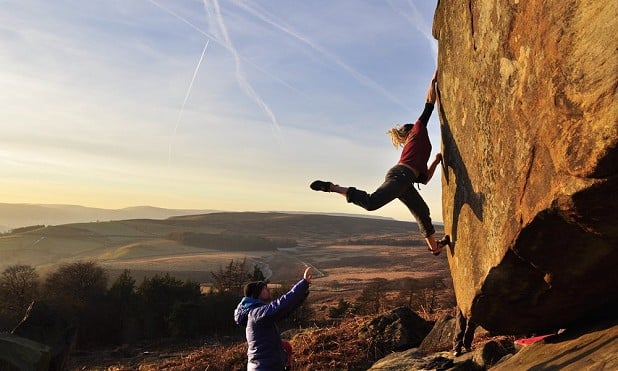
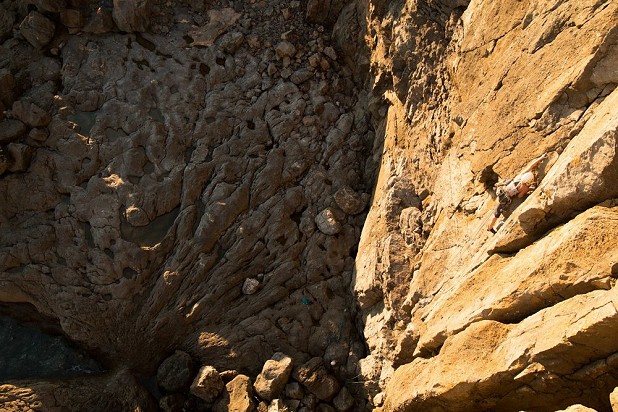
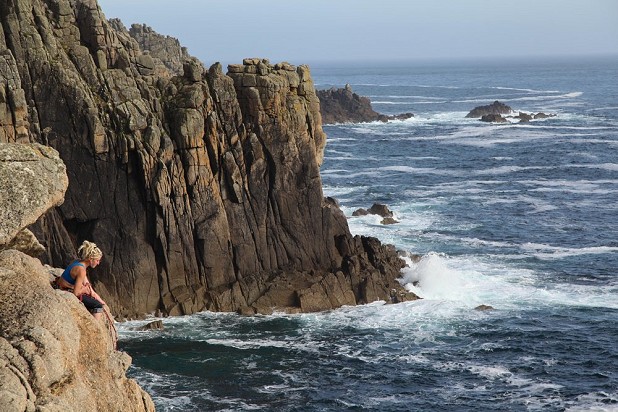
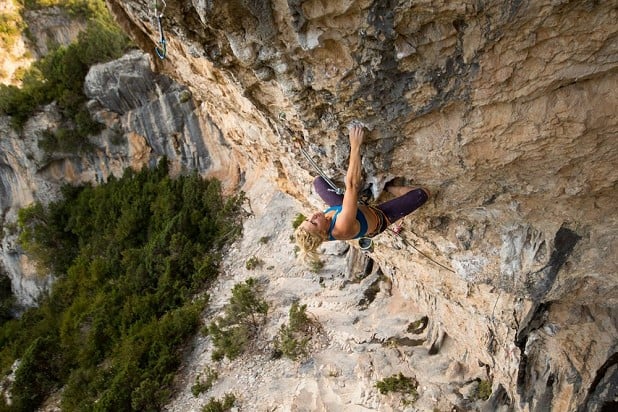
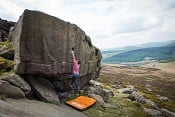
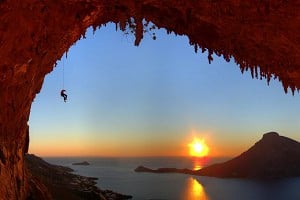







Comments